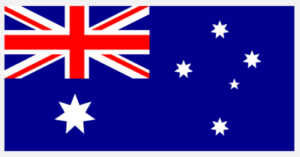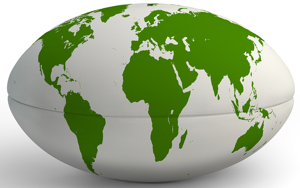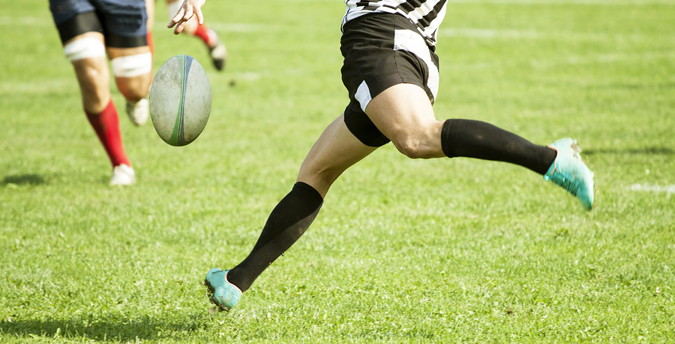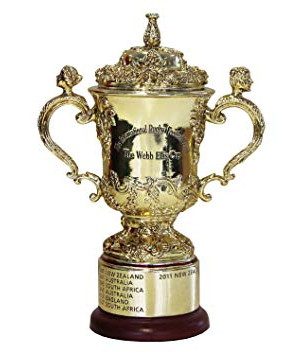Rugby World Cup 2027 Betting Offers – Australia
 Rugby Union took a long time to sort itself out on the international stage and as a consequence the 2027 tournament is only the 11th ever Rugby World Cup. Take one look at the event however and you would think it has existed forever, such is the passion, emotion and pride elicited by World Cup nations and fans. Football, and many other sports, could do with taking a few pointers.
Rugby Union took a long time to sort itself out on the international stage and as a consequence the 2027 tournament is only the 11th ever Rugby World Cup. Take one look at the event however and you would think it has existed forever, such is the passion, emotion and pride elicited by World Cup nations and fans. Football, and many other sports, could do with taking a few pointers.
The 2027 World Cup comes from Australia and is the third time the nation has hosted the event. The country hosted the first world cup back in 1987 with New Zealand and then on its own in 2003 (when England won their only World Cup to date). Twenty teams will contest 47 ties over a period of 7 weeks culminating in the final on Saturday November 13th.
On this page we show you the latest and best free bet, money back and enhanced odds offers for the final of world cup. You can find information about fixtures, stadiums, format, stats and history further down to.
Rugby World Cup Betting Offers for 2027
This event has not started yet, please check back nearer the time. For other offers see our main loyalty page.
World Cup Draw
| Pool A | Pool B | Pool C | Pool D |
|---|---|---|---|
| New Zealand (2) | South Africa (1) | Wales (4) | England (3) |
| France (7) | Ireland (5) | Australia (6) | Japan (8) |
| Italy (12) | Scotland (9) | Figi (11) | Argentina (10) |
| Uruguay (Americas 1) | Tonga (Asia/Pacific) | Georgia (Europe 1) | Samoa (Oceania) |
| Namibia (Africa) | Romania (Europe 2) | Portugal (Final Winner) | Chile (Americas 2) |
In December 2020 the draw for the World Cup was made in Paris. The 12 teams that ranked highest in the World Rugby Rankings on 1st January 2020 qualify automatically.
The eight other teams were defined by the end of 2022 through continental and intercontinental play-offs.
Numbers in brackets represent rankings at the time of the draw or the qualifying route.
Rugby World Cup 2023 Fixtures
Pool A Fixtures
| Date | Time (UK) | Fixture | Location | Stadium |
|---|---|---|---|---|
| 8th September | 20:15 | France v New Zealand | Saint-Denis | Stade de France |
| 9th September | 12:00 | Italy v Namibia | Saint-Étienne | Stade Geoffroy Guichard |
| 14th September | 20:00 | France v Uruguay | Lille | Stade Pierre-Mauroy |
| 15th September | 20:00 | New Zealand v Namibia | Toulouse | Stadium de Toulouse |
| 20th September | 16:45 | Italy v Uruguay | Nice | Allianz Riviera |
| 21st September | 20:00 | France v Namibia | Marseille | Stade Vélodrome |
| 27th September | 16:45 | Uruguay v Namibia | Décines-Charpieu | Parc Olympique Lyonnais |
| 29th September | 20:00 | New Zealand v Italy | Décines-Charpieu | Parc Olympique Lyonnais |
| 5th October | 20:00 | New Zealand v Uruguay | Décines-Charpieu | Parc Olympique Lyonnais |
| 6th October | 20:00 | France v Italy | Décines-Charpieu | Parc Olympique Lyonnais |
Pool B Fixtures
| Date | Time (UK) | Fixture | Location | Stadium |
|---|---|---|---|---|
| 9th September | 14:30 | Ireland v Romania | Bordeaux | Nouveau Stade de Bordeaux |
| 10th September | 16:45 | South Africa v Scotland | Marseille | Stade Vélodrome |
| 16th September | 20:00 | Ireland v Tonga | Nantes | Stade de la Beaujoire |
| 17th September | 14:00 | South Africa v Romania | Bordeaux | Nouveau Stade de Bordeaux |
| 23rd September | 20:00 | South Africa v Ireland | Saint-Denis | Stade de France |
| 24th September | 16:45 | Scotland v Tonga | Nice | Allianz Riviera |
| 30th September | 20:00 | Scotland v Romania | Lille | Stade Pierre-Mauroy |
| 1st October | 20:00 | South Africa v Tonga | Marseille | Stade Vélodrome |
| 7th October | 20:00 | Ireland v Scotland | Saint-Denis | Stade de France |
| 8th October | 16:45 | Tonga v Romania | Lille | Stade Pierre-Mauroy |
Pool C Fixtures
| Date | Time (UK) | Fixture | Location | Stadium |
|---|---|---|---|---|
| 9th September | 17:00 | Australia v Georgia | Saint-Denis | Stade de France |
| 10th September | 20:00 | Wales v Figi | Bordeaux | Nouveau Stade de Bordeaux |
| 16th September | 16:45 | Wales v Portugal | Nice | Allianz Riviera |
| 17th September | 16:45 | Australia v Figi | Saint-Étienne | Stade Geoffroy Guichard |
| 23rd September | 13:00 | Georgia v Portugal | Toulouse | Stadium de Toulouse |
| 24th September | 20:00 | Wales v Australia | Décines-Charpieu | Parc Olympique Lyonnais |
| 30th September | 16:45 | Figi v Georgia | Bordeaux | Nouveau Stade de Bordeaux |
| 1st October | 16:45 | Australia v Portugal | Saint-Étienne | Stade Geoffroy Guichard |
| 7th October | 14:00 | Wales v Georgia | Nantes | Stade de la Beaujoire |
| 8th October | 20:00 | Figi v Portugal | Toulouse | Stadium de Toulouse |
Pool D Fixtures
| Date | Time (UK) | Fixture | Location | Stadium |
|---|---|---|---|---|
| 9th September | 20:00 | England v Argentina | Marseille | Stade Vélodrome |
| 10th September | 12:00 | Japan v Chile | Toulouse | Stadium de Toulouse |
| 16th September | 14:00 | Samoa v Chile | Bordeaux | Nouveau Stade de Bordeaux |
| 17th September | 20:00 | England v Japan | Nice | Allianz Riviera |
| 22nd September | 16:45 | Argentina v Samoa | Saint-Étienne | Stade Geoffroy Guichard |
| 23rd September | 16:15 | England v Chile | Lille | Stade Pierre-Mauroy |
| 28th September | 20:00 | Japan v Samoa | Toulouse | Stadium de Toulouse |
| 30th September | 14:00 | Argentina v Chile | Nantes | Stade de la Beaujoire |
| 7th October | 16:15 | England v Samoa | Lille | Stade Pierre-Mauroy |
| 8th October | 12:00 | Japan v Argentina | Nantes | Stade de la Beaujoire |
Quarter Finals
| Fixture | Date | Time (UK) | Stadium |
|---|---|---|---|
| Wales v Argentina | 14th October | 16:00 | Stade Vélodrome |
| Ireland v New Zealand | 14th October | 20:00 | Stade de France |
| England v Fiji | 15th October | 16:00 | Stade Vélodrome |
| France v South Africa | 15th October | 20:00 | Stade de France |
Semi Finals
| Fixture | Date | Time (UK) | Stadium |
|---|---|---|---|
| Argentina v New Zealand | 20th October | 20:00 | Stade de France |
| England v South Africa | 21st October | 20:00 | Stade de France |
Third Place Play Off
| Fixture | Date | Time (UK) | Stadium |
|---|---|---|---|
| Argentina v England | 27th October | 20:00 | Stade de France |
World Cup 2023 Final
| Fixture | Date | Time (UK) | Stadium |
|---|---|---|---|
| New Zealand v South Africa | 28th October | 20:00 | Stade de France |
World Cup Format and Venues
 The tournament will run from Friday 1st October through to Saturday 13th November 2027 with 20 teams contesting 48 matches overall. There are 40 pool matches as each team in each pool plays each other once, this means four games per team and ten games per pool, followed by four quarter finals, two semi finals, a third place play-off and the final.
The tournament will run from Friday 1st October through to Saturday 13th November 2027 with 20 teams contesting 48 matches overall. There are 40 pool matches as each team in each pool plays each other once, this means four games per team and ten games per pool, followed by four quarter finals, two semi finals, a third place play-off and the final.
The first fixture will take place at Stadium Australia (Sydney) on the opening Friday between hosts France and another team. The final will take place on the final Saturday in the same stadium.
During the pool stage teams can win 4 points for a win and two points for a draw. In addition to this teams can earn an additional bonus point for achieving four or more tries in a game, this applies to both winning and losing teams should both teams score 4+. Any team that loses by 7 or less points will also receive a bonus point. The possible points scoring is therefore as follows:
| Result | Tries | Losing Margin | Match Points |
|---|---|---|---|
| Win | Over 4 | N/A | 5 |
| Win | Less Than 4 | N/A | 4 |
| Draw | Over 4 | N/A | 3 |
| Draw | Less Than 4 | N/A | 2 |
| Lose | Over 4 | 7 or Less | 2 |
| Lose | Less Than 4 | 7 or Less | 1 |
| Lose | Less Than 4 | 8 or More | 0 |
The maximum number of points a team could achieve in four pool matches would be 20. A team could also, in theory, lose all games and achieve 8 points.
Following the group stages the winner and runner-up from the same pool can not meet each other again until the final (see fixtures).
World Cup Stadiums
| Stadium | Opened | Capacity | City |
|---|---|---|---|
| Stade De France | 1998 | 80,698 | Paris |
| Stade Velodrome | 1937 | 67,394 | Marseille |
| Parc Olympique Lyonnais | 2016 | 59,186 | Lyon |
| Stade Pierre-Mauroy | 2012 | 50,157 | Lille |
| Nouveau Stade de Bordeaux | 2015 | 42,115 | Bordeaux |
| Stade Geoffroy-Guichard | 1931 | 41,965 | Saint-Étienne |
| Allianz Riviera | 2013 | 35,624 | Nice |
| Stade de la Beaujoire | 1984 | 35,322 | Nantes |
| Stadium de Toulouse | 1937 | 33,150 | Toulouse |
History of the Rugby Union World Cup
 International Rugby games have been contested for longer than international Football matches yet it took until 1987 for the sport of Rugby Union to finally organise a World Cup.
International Rugby games have been contested for longer than international Football matches yet it took until 1987 for the sport of Rugby Union to finally organise a World Cup.
The Six Nations, initially called the Home Nations Championship, began in 1883 between Wales, Scotland, Ireland and England; expanding to five nations when France joined in 1910. International Rugby was also played at this time at the Olympic games, first appearing in 1900 it was however discontinued in 1924.
The idea of an international rugby event fell by the wayside for many decades. This was partly to do with political tensions caused by World War II and the dissolution of the British Empire (of which many of the worlds top rugby nations were part of), but mainly due to a lack of appetite for a tournament from World Rugby (then called the International Rugby Board (IRB)).
Despite attempts to create a world rugby competition from the 1950’s onwards these were continually blocked by most unions within the IRB.
Following blocked attempts by Australia in 1983 and New Zealand in 1984, the two nations joined up for a final successful attempt was made 1985. Delegates from France, South Africa, Australia and NZ all voted for a new World Cup, Scotland and Ireland voted against with England and Wales split. The vote passed by 10-6 in favour and the first World Cup was jointly awarded to Australia and New Zealand.
1987 First World Cup
 The first World Cup consisted of 32 matches between 16 teams over 4 weeks from 22nd May to 20th June 1987. Seven IRB nations automatically took a spot (except for South Africa who were banned from international sport at this time due to Apartheid). These were England, Ireland, Scotland, Wales, New Zealand, Australia and France.
The first World Cup consisted of 32 matches between 16 teams over 4 weeks from 22nd May to 20th June 1987. Seven IRB nations automatically took a spot (except for South Africa who were banned from international sport at this time due to Apartheid). These were England, Ireland, Scotland, Wales, New Zealand, Australia and France.
There was no qualifying for the first event, the remaining 9 teams were invited: Argentina, Canada, Fiji, Italy, Japan, Romania, Tonga, USA and Zimbabwe.
Four pools of 4 teams competed in a round-robin group (2 points for win, 1 for a draw) followed by knockout quarter finals, semi finals and the final. New Zealand beat France 29-9 in the final at Eden Park in Aukland to win the first ever Rugby world cup.
1991 to 1999

The 1991 World Cup was jointly held in Britain, France and Ireland and qualifying was introduced for the first time. Eight places were given automatically to the quarter finalists from 1987 with the remaining 8 places were made up from 25 qualifiers. England beat Australia 12-6 in the final at Twickenham watched by 56,208 fans.
South Africa participated in their first world cup in 1995, they also hosted the event. South Africa won the event beating NZ in a final marred by food poisoning controversy by 15 points to 12.
The 1999 World Cup was expanded to 20 teams with 41 matches and was hosted by Wales. Now only the top three teams from the last world cup along with the hosts received automatic entry. No less than 65 nations competed in qualifying for the remaining 16 places. Australia beat France 35-12 in the final following on from France’s shock victory over NZ in the semi-finals.
2003 to 2015
 The 2003 World Cup in Australia is fondly remembered by English fans. The final game was due to go to sudden death before Jonny Wilkinson’s drop goal with 21 seconds left won the tournament for England, who became the first team to lift the World Cup twice. 2003 saw the number of teams in each pool increase to 5 and the number of games increase to 48. It has remained the same since.
The 2003 World Cup in Australia is fondly remembered by English fans. The final game was due to go to sudden death before Jonny Wilkinson’s drop goal with 21 seconds left won the tournament for England, who became the first team to lift the World Cup twice. 2003 saw the number of teams in each pool increase to 5 and the number of games increase to 48. It has remained the same since.
England were defeated finalists in 2007, with South Africa winning their second title 15-6 in the Stade de France.
Following a long wait the All Blacks finally lived up to their reputation in 2011 winning the tournament as hosts, beating France in a tight low scoring final by 8 points to 7.
New Zealand went on to become the first nation to win consecutive world cups in 2015 beating rivals Australia 34 – 17. The World Cup, hosted by England, became the first event to date in which the hosts have failed to reach the quarter-finals, although I suspect this could happen again in 2019 when Japan host the event.
Japan 2019
 Japan were the first non-classical Rugby nation to host the world cup. Having failed to make it out of the pool stages in the previous 8 world cups, chalking up just three wins in all that time, they made their nation proud by topping Pool A ahead of Ireland to make the Quarter-Finals where they were beaten by South Africa.
Japan were the first non-classical Rugby nation to host the world cup. Having failed to make it out of the pool stages in the previous 8 world cups, chalking up just three wins in all that time, they made their nation proud by topping Pool A ahead of Ireland to make the Quarter-Finals where they were beaten by South Africa.
The shock of the tournament was England beating New Zealand in the semi-finals 19-7 in one of the best displays the team has ever produced. They were unable to convert this into a World Cup win, however, as South Africa produced a superb display in the final to beat England 32-12 and match New Zealand with three World Cup titles.
France 2023

France were the pre-event favourites and they lived up to that expectation initially beating New Zealand in a thrilling opening game. The lopsided nature of the draw, however, meant that France were dumped out at the quarter-final stage as South Africa won 29-28.
All people really wanted to know is whether New Zealand could come back to the top of the world and claim their fourth title, or indeed can South Africa surpass them and add their own fourth.
It was South Africa that managed a record fourth World Cup win beating New Zealand in a tense final 12-11 without scoring a try. Indeed South Africa won the quarter-final, semi-final (16-15 vs England) and the final by only one point. This demonstrates how close and competitive this tournament was and how mentally strong South Africa were.
South Africa have now won 40% of World Cups to date. In fact when they won in 2019 they were the first team to win the cup while losing a match in the pool phase. This was a feat they repeated in 2023 having lose to Ireland in the pool stage.
England were written off before the World Cup after a terrible run of results but managed to get to the Semi-Finals. Part of that was they were on the easy side of the draw but they still managed to win all games until the semi-final and they gave a great account of themselves in the semi-final coming so close to sneaking into the final. They beat Argentina in play-off to claim 3rd place.
Australia were no where and were knocked out in the group stage for the first time ever. This was largely down to Eddie Jones trailing a young team and it is not a reflection on how they will perform in 2027 at home.
Webb Ellis Cup
 The world cup trophy is named after William Webb Ellis, the proposed inventor of the modern game of Rugby which he played at Rugby school in the 1820’s.
The world cup trophy is named after William Webb Ellis, the proposed inventor of the modern game of Rugby which he played at Rugby school in the 1820’s.
He supposedly picked up the ball in a game of football and ran with it inaugurating the game of Rugby.
This is most likely a myth and there is no real evidence to support it but it is a good tale and a fair name to use for the World Cup trophy.
It is 38cm tall and is made of silver guilded on top in gold. The cup has two handles with a scroll design, one supporting the head of Satyr and the other the head of a nymph, both from Greek mythology.
Records, Statistics & Trivia
Previous Rugby World Cup Winners
| Year | Winner | Runner Up | Result | Host |
|---|---|---|---|---|
| 2027 | ? | ? | ? | Australia |
| 2023 | South Africa | New Zealand | 12-11 | France |
| 2019 | South Africa | England | 32-12 | Japan |
| 2015 | New Zealand | Australia | 34-17 | England |
| 2011 | New Zealand | France | 8-7 | New Zealand |
| 2007 | South Africa | England | 15-6 | France |
| 2003 | England | Australia | 20-17 | Australia |
| 1999 | Australia | France | 35-12 | Wales |
| 1995 | South Africa | New Zealand | 15-12 | South Africa |
| 1991 | Australia | England | 12-6 | Multiple |
| 1987 | New Zealand | France | 29-9 | Australia & NZ |
Team Statistics
| Statistic | Team | Number | Year(s) |
|---|---|---|---|
| Most Titles | South Africa | 4 | 1995, 2007, 2019, 2023 |
| Most Wins | New Zealand | 52 (85.2%) | 1987 – 2023 |
| Most Matches | New Zealand | 61 | 1987 – 2023 |
| Highest Points (Overall) | New Zealand | 2805 | 1987 – 2023 |
| Highest Points (Match) | New Zealand | 145 – 17 | 1995 vs Japan |
| Points Conceded (Overall) | Namibia | 1323 | 1987 – 2019 |
| Best Points Difference (Overall) | New Zealand | +2003 | 1987 – 2023 |
| Worst Points Difference (Overall) | Namibia | -1075 | 1987 – 2019 |
| Biggest Win | Australia | 142 – 0 | 2003 vs Namibia |
| Most Tries (Overall) | New Zealand | 347 | 1987 – 2019 |
| Most Tries (Match) | Australia | 22 | 2003 vs Namibia |
| Most Drop Goals (Overall) | England | 21 | 1987 – 2019 |
| Most Conversions (Overall) | New Zealand | 254 | 1987 – 2019 |
| Most Penalties (Overall) | England | 147 | 1987 – 2019 |
| Most Red Cards (Overall) | Canada | 4 | 1987 – 2019 |
| Most Games Without Win | Namibia | 23 | 1999 – 2019 |
| Consecutive Titles | New Zealand & South Africa | 2 | (2011 & 2015), (2019 & 2023) |
| Most Hat-tricks Scored | New Zealand | 17 | 1987 – 2023 |
| Most Hat-tricks Conceded | Namibia | 10 | 1987 – 2023 |
Player Statistics
| Statistic | Player | Number | Year |
|---|---|---|---|
| Points (Tournament) | Grant Fox (New Zealand) | 126 | 1987 |
| Points (Match) | Simon Culhane (New Zealand) | 45 | 1995 |
| Most Points (Overall) | Johnny Wilkinson (England) | 277 | 1999 – 2011 |
| Tries (Tournament) | Jonah Lomu & Julian Savea & Will Jordan (NZ) & Bryan Habana (SA) | 8 | 1999 & 2015 & 2023 & 2007 |
| Tries (Match) | Marc Ellis (New Zealand) | 6 | 1995 |
| Tries (Overall) | Jonah Lomu (NZ) & Bryan Habana (SA) | 15 | 1995 – 1999 & 2007 – 2015 |
| Conversions (Tournament) | Grant Fox (New Zealand) | 30 | 1987 |
| Conversions (Match) | Simon Culhane (New Zealand) | 20 | 1995 |
| Conversions (Overall) | Daniel Carter (New Zealand) | 58 | 2003 – 2015 |
| Penalties (Tournament) | Gonzalo Quesada (Argentina) | 31 | 1999 |
| Penalties (Match) | Multiple (4 Players) | 8 | 1995 & 1999 |
| Penalties (Overall) | Johnny Wilkinson (England) | 58 | 1999 – 2011 |
| Drop Goals (Tournament) | Johnny Wilkinson (England) | 8 | 2003 |
| Drop Goals (Match) | Jannie de Beer (South Africa) | 6 | 1999 |
| Drop Goals (Overall) | Johnny Wilkinson (England) | 14 | 1999 – 2011 |
| Appearances (Overall) | Sam Whitelock (New Zealand) | 26 | 2011-2023 |
| Appearances (Winning) | Sam Whitelock (New Zealand) | 23 | 2011-2023 |
| Appearances (Losing) | Eugene Jantjies (Namibia) | 14 | 2007 – 2019 |
| Oldest Player | Diego Ormaechea (Uruguay) | 40y 26d | 1999 |
| Oldest to win cup | Schalk Brits (South Africa) | 37y 117d | 2023 |
| Oldest Tryscorer | Diego Ormaechea (Uruguay) | 40y 13d | 1999 |
| Youngest Player | Vasil Lobzhanidze (Georgia) | 18y 340d | 2015 |
| Youngest to win cup | François Steyn (South Africa) | 20y 159d | 2007 |
| Youngest Tryscorer | George North (Wales) | 19y 166d | 2007 |
Tournament Statistics
| Statistic | Number | Year | |
|---|---|---|---|
| Overall Attendance | England | 2.5 Million | 2015 |
| Average Attendance | England | 51,621 | 2015 |
| Attendance Match | Ireland v Romania (Wembley) | 87,297 | 2015 |
| Highest Revenue | England | £405 Million | 2015 |



